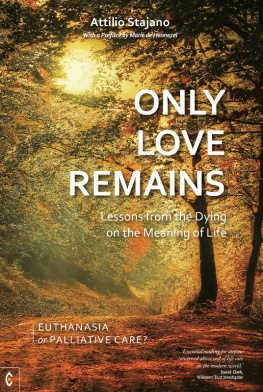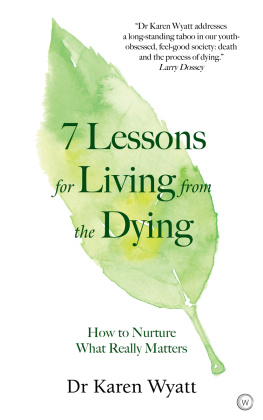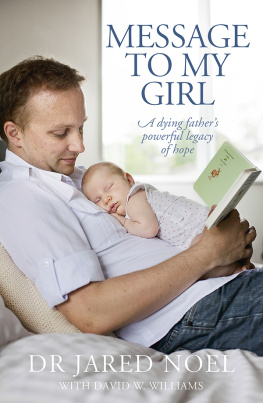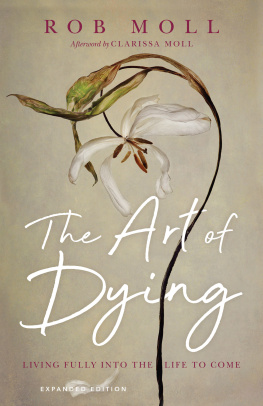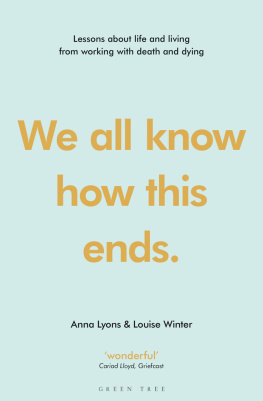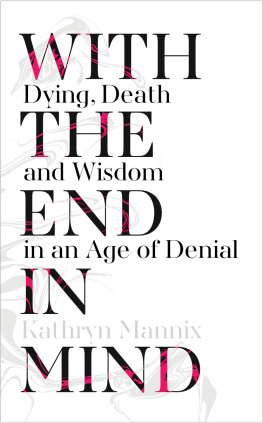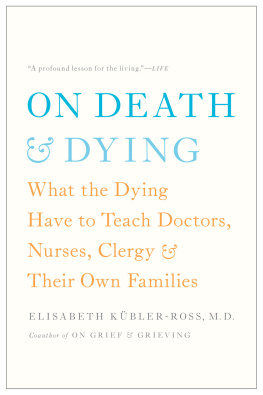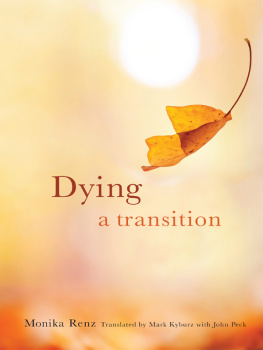
ATTILIO STAJANO works as a volunteer at the palliative care ward of a Brussels hospital. He has been an industrial researcher at IBM, administrator of research programmes on Information Technology at the European Commission, university professor on Industrial EU Research for Competitiveness in Bologna and at the Georgia Institute of Technology in Atlanta, GA, and European Union Fellow at the University of Pittsburgh, PA. His website is www.stajano.org.
PRAISE FOR ONLY LOVE REMAINS:
Simple and precise words that say fundamental things about the thoughts and affections of those who discover and present to us the meaning of the life they are leaving. - Tullio De Mauro, past Minister of Education, Professor of Linguistics, University of Rome La Sapienza
We find here something that undermines and subverts our schemes: the sick are a resource that helps us in our search for the meaning of life. -Sergio Mattarella, President of the Italian Republic
Reading this book leads to the conviction that we should not miss this experience of assisting a loved one who is close to death. We should not be afraid. We should let our hearts speak; let our intuition guide our actions. We will discover unexpected resources in ourselves: a tenderness, a touch, a readiness to assist that, perhaps, we did not even believe ourselves capable of. In brief, we will emerge from this experience more generous and more human, because on the brink of death it is love that has the last word. - Marie de Hennezel, author of Seize the Day, How the dying teach us to live
A compelling narrative about care and people in the face of death. Written with grace and insight, this should be essential reading for anyone concerned about end of life care in the modern world. - David Clark, Wellcome Trust Investigator, University of Glasgow
ONLY LOVE REMAINS
LESSONS FROM THE DYING
ON THE MEANING OF LIFE
EUTHANASIA OR PALLIATIVE CARE?
ATTILIO STAJANO
Translated from Italian by Patricia Brigid Garvin
Preface by Marie de Hennezel

Clairview Books Ltd.,
Russet, Sandy Lane,
West Hoathly,
West Sussex RH19 4QQ
www.clairviewbooks.com
Published in Great Britain in 2015 by Clairview Books
First published in 2013 under the title Lamore, sempre: Il senso della vita nel racconto dei malati terminali by Lindau s.r.l, Torino
Attilio Stajano 2015
Preface Carnets Nord/Marie de Hennezel 2014
This translation Clairview Books 2015
This book is copyright under the Berne Convention. All rights reserved. Apart from any fair dealing for the purpose of private study, research, criticism or review, no part of this publication may be reproduced, stored in a retrieval system, or transmitted in any form or by any means, electronic, electrical, chemical, mechanical, optical, photocopying, recording or otherwise, without the prior written permission of the copyright owner. Inquiries should be addressed to the Publishers
The right of Attilio Stajano to be identified as the author of this work has been asserted in accordance with sections 77 and 78 of the Copyright, Designs and Patents Act, 1988
A CIP catalogue record for this book is available from the British Library
Print book ISBN 978 1 905570 77 5
Ebook ISBN 978 1 905570 68 3
Fifty per cent of the author's royalties from this book will be donated to
Fondation Prive Soins Palliatifs Clinique de lEurope
(IBAN BE58068250391379; BIC GKCCBEBB)
Cover by Morgan Creative featuring a photograph Valiunic
Typeset by DP Photosetting, Neath, West Glamorgan
To Michel Stroobant,
palliative doctor,
teacher, friend, and
pioneer of palliative care in Belgium,
and to all the healthcare staff
he has trained and guided for twenty years.
The author would like to thank his wife, Kathleen, and friends and family members who have read this book in the course of its preparation, offering their encouragement, advice and correcting errors: Martine, Catherine, Saura, Cristina, Angel, Isabelle, Piera, Francesco, Aska and Bruce.
Contents
Preface
What Attilio Stajano and I have in common is the profound, shared conviction that to die peacefully, without suffering and surrounded by love and spirituality, is not an exceptional experience.
I know this because for nine years I worked in the first palliative care unit in France, among people for whom curative medicine no longer held any prospects, but who were still alive and wished to remain so until their last breath. Together with a motivated and competent team, we decided to do everything possible to ensure our terminally ill patients did not suffer, and could die at the proper time with the sense of still being the subjects of their own death. Twenty years ago, I wrote about our pilot scheme in a book called La Mort intime, whose preface was written by the then dying president, Franois Mitterrand. The book spread around the world and acted as a model for the development of palliative care units throughout Europe.
In fact, it was at one of these units in Brussels that Attilio generously offered his services as a volunteer after he retired. Reading his narrative, written with delicacy and feeling, I experienced the same emotions I had felt all those years ago. I rediscovered the lessons that the terminally ill had taught me through their way of being, their sense of humour, their humility and their courage.
Offering daily support to men and women whom medicine can no longer heal, yet can assist in the most dignified and humane manner possible, is no trivial matter in a world that denies death and regards the time of dying as a useless, painful and absurd time. Public opinion today widely considers that it is better to limit this time rather than live through it. What is the point in waiting for death when we know that medicine will not be able to heal us? But this way we exclude an incomparable experience. And it is precisely this that we discover when reading Attilio's account. Because the last exchanges with someone who is on the verge of death: the looks, the gestures, the words of love, relief or trust, allow those left behind to experience grief in a completely different way and enrich the rest of their lives. We are no longer the same people we were after assisting a relative or friend on the brink of death. Assisting them transforms us. Why is that? Because we are all mortal, aware that we are visitors on this earth, and that those we love will not always be by our side. And if, on the one hand, this closeness to the death of others is a sword that strikes at the heart of our humanity and hurts us, on the other, it brings us back to what is essential.
Of course, it is not easy to assist people in their last moments in hospitals that have moved away from their vocation of caring for and supporting patients, to become instead economically-oriented technocentric structures. There is a whole movement, one in which I actively participated, that has done its utmost to ensure that the practice of palliative care is firmly established in hospitals and in the medical and medical social services. The aim is to develop a palliative spirit, so that wherever death occurs, people are able to conclude their lives with dignity. When, for example, the head of a medical oncology department, or the director of a nursing home for non-autonomous elderly people, has grasped the importance of
Next page
